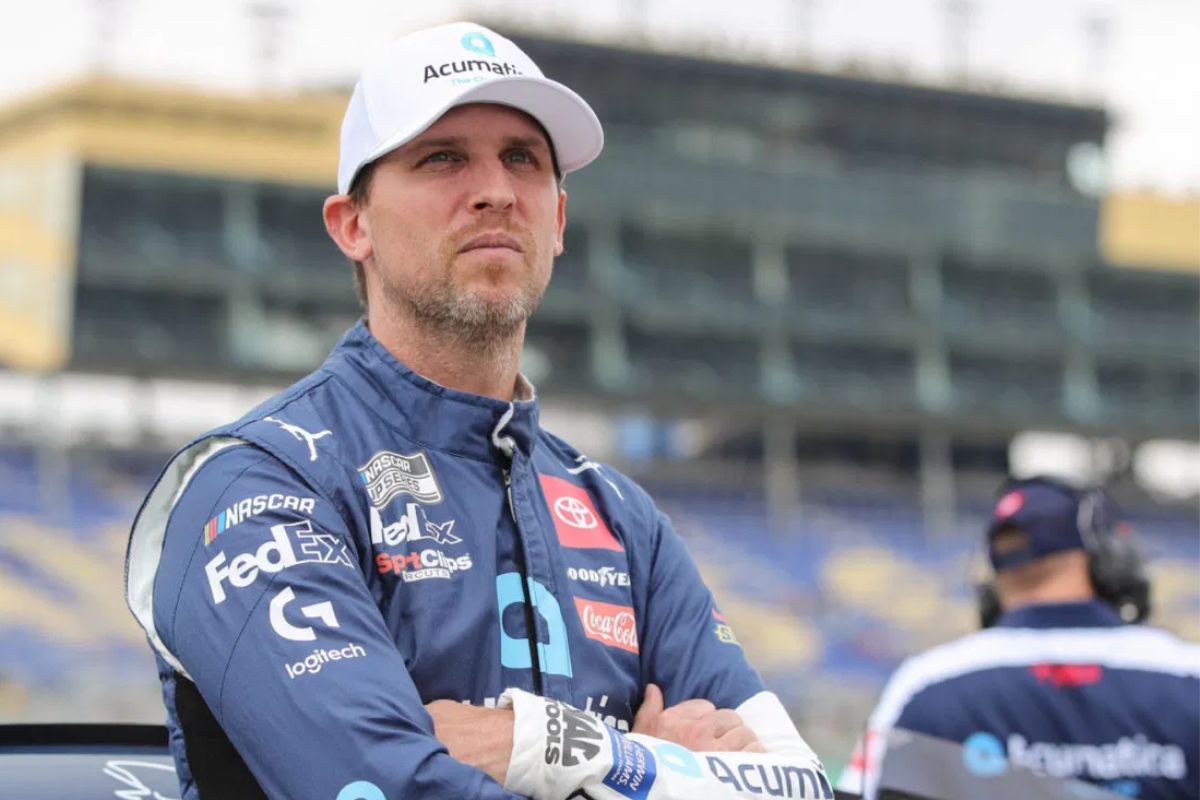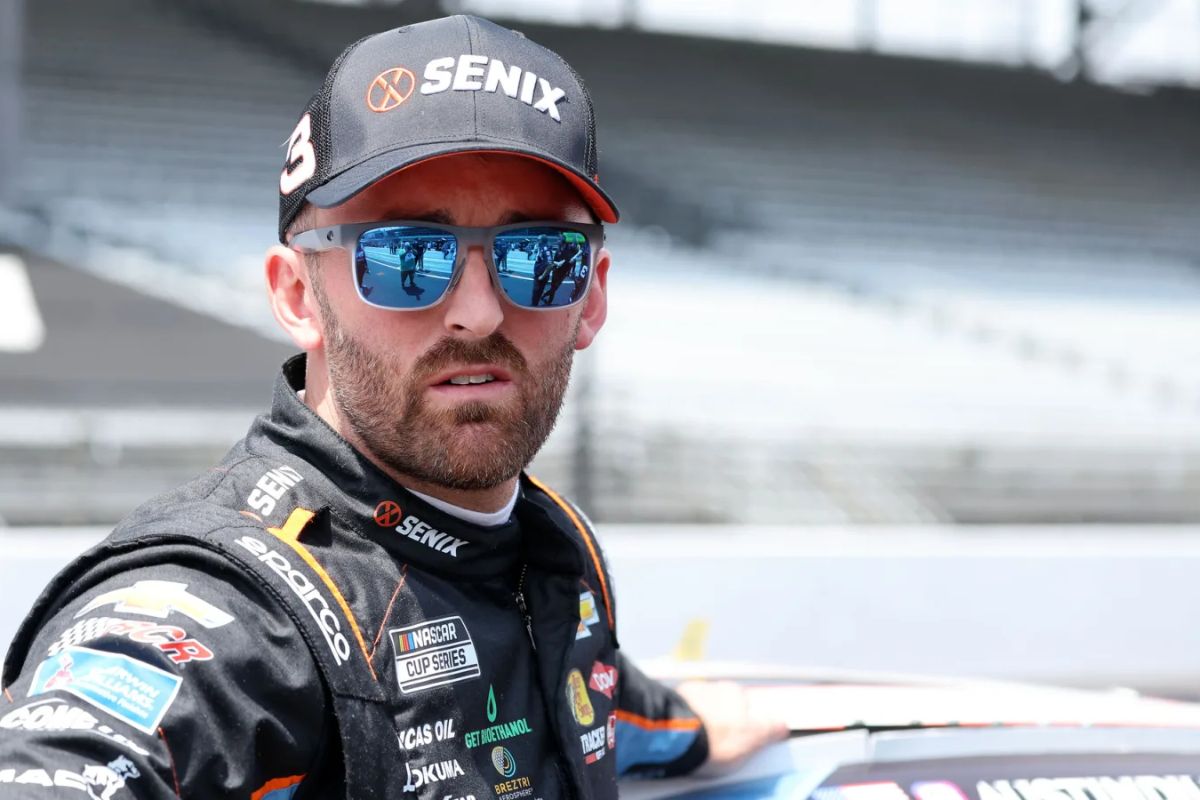Denny Hamlin Slams NASCAR’s Playoff Format: Denny Hamlin‘s recent critique of NASCAR’s playoff format raises vital questions about the balance between entertainment and competitive integrity within the sport. By asserting that the current system allows inconsistent performers to advance based on isolated victories, Hamlin highlights a growing discontent among traditional fans who prioritize skill and reliability. This commentary reflects a personal grievance and signals a broader concern regarding the ethical implications of the rules governing the sport. As the debate unfolds, it becomes essential to examine how these dynamics affect the future of NASCAR and its relationship with its audience.
Key Highlights
- Denny Hamlin criticizes NASCAR’s playoff format for rewarding luck over consistent performance, undermining the competitive integrity of the sport.
- The playoff system’s focus on spectacle leads to aggressive strategies, raising ethical concerns regarding individual advancement.
- Hamlin’s statements reflect a broader discontent among drivers who feel the current structure compromises fairness in competition.
- The disparity in charter payouts exacerbates the divide between consistent performers and those who benefit from opportunistic playoff qualifications.
Denny Hamlin’s Critique of NASCAR’s Playoff System
Denny Hamlin’s critique of NASCAR’s playoff system highlights the inherent unpredictability and contentious nature of the format, particularly as it influences driver behavior and race outcomes.
The racing environment engendered by the playoff structure compels drivers to adopt aggressive strategies, often leading to controversial incidents on the track. Hamlin’s commentary emphasizes concerns that the current system may prioritize spectacle over skill, resulting in decisions that can undermine the sport’s integrity.
In the context of Austin Dillon’s recent actions during the Richmond race, Hamlin’s perspective gains further relevance. Dillon’s aggressive tactics, aimed at securing a playoff position, exemplify the lengths to which drivers may go when placed under the strain of a high-risk playoff format. This scenario raises significant questions about the ethical implications of such behavior, as drivers may prioritize individual advancement over sportsmanship and fair competition.
Hamlin’s reflections also point to a vital paradox within the playoff system: while it aims to create excitement and viewer engagement, it simultaneously risks alienating traditional fans who value the sport’s competitive integrity.
The reliance on aggressive tactics can transform racing into a series of tactical battles rather than a display of driving skill. As the playoffs approach their climax, Hamlin’s insights serve as a call to reevaluate the balance between entertainment and integrity, urging stakeholders to reflect on reforms that could better align the format with the core values of NASCAR racing.
Hamlin’s Thoughts on Richmond and the Playoff System
Reflecting on the recent race at Richmond, Hamlin expresses concern regarding the implications of the playoff system, particularly how it allows drivers like Austin Dillon to secure playoff positions through aggressive tactics despite not consistently performing at a top level. Hamlin, currently fourth in the standings, believes that the format undermines the integrity of the sport by rewarding luck over merit.
In his critique, Hamlin emphasizes the inconsistency of teams that, despite inferior performance metrics, can exploit the system to reach the playoffs. He notes that a single win can overshadow a season’s worth of subpar results, which he finds troubling. This sentiment resonates with many fans and competitors who value sustained excellence over opportunistic victories
“Obviously, the #3 team is not a top 16 team… Racing nowadays, fuel mileage, this that and the other, one win is too easy to get to like say that, ‘Okay, then you should battle for the championship,’”
“I think they had a top-30 rule in place for a reason. To keep people from being absolutely horrible all year long and then lucking up and getting a win.” – hamlin
Hamlin’s remarks highlight a growing discontent with the playoff format, suggesting that a return to stricter performance regulations could restore competitive fairness. By advocating for a system that prioritizes ongoing achievement, he seeks to uphold the spirit of NASCAR as a true test of skill and endurance, rather than a mere game of chance.
Dillon’s Controversial Victory and Hamlin’s Criticism
How does Austin Dillon’s controversial victory at Richmond highlight the flaws in NASCAR’s playoff system, as criticized by Denny Hamlin? Dillon’s win, achieved despite entering the race ranked 32nd in the regular season standings, exemplifies the contentious nature of a playoff format that allows subpar performers to secure postseason berths through a singular stroke of luck. This result raises critical questions about the integrity of the sport and the criteria for playoff eligibility.
Now, he wasn’t gonna luck up and get a win until he did that. He was gonna get a win legitimately, right?”
“cars 25th, 32nd in points deserve to be in the playoffs ‘cause they get a win.”
“I just think that you’re watering down what this is all about, for sure. But that’s a separate conversation… I mean it makes it easier for me by the way, cause you know, the road to the championship gets easier.” – hamlin
Hamlin’s critique emphasizes that such scenarios dilute the competitive spirit inherent in racing. He argues that allowing cars positioned as low as 25th or 32nd in points to qualify for playoffs based on wins undermines the meritocracy traditionally associated with motorsports. According to Hamlin, this not only distorts the significance of consistent performance throughout the season but also complicates the narrative of what it means to be a championship contender.
Hear from @joeylogano after a wild finish at @RichmondRaceway. pic.twitter.com/icSfwhzSnu
— NASCAR (@NASCAR) August 12, 2024
Dillon’s last-lap tactic, which propelled him past playoff hopefuls, accentuates the disconnect between performance and playoff qualification. This controversial method of securing a playoff spot raises concerns among competitors and fans alike, who may question the fairness and legitimacy of the playoff structure.
Denny Hamlin on the Impact of the Playoff System
The implications of the playoff system extend beyond individual races, greatly affecting the financial landscape and competitive dynamics within NASCAR, as emphasized by Hamlin’s observations on the disparities in charter payouts and playoff qualifications. Hamlin’s critique highlights a critical issue: drivers who perform consistently throughout the season may find their efforts undermined by a system that rewards playoff positioning over overall performance.
The financial ramifications are glaring. As Hamlin articulated, the difference between finishing 16th and 30th in points can equate to a considerable monetary gap—approximately two million dollars in charter payouts. This disparity creates an environment where the emphasis shifts from meritocracy to a survival-of-the-fittest scenario, causing drivers to prioritize playoff qualifications over consistent racing excellence.
“Probably about 2 million bucks in what the charter will get paid. That’s the key is that …. is to put a: ‘I’m a playoff driver.’ It’s quite the different playoff driver than others when you think about the context. But you know, if this stands, I believe that months, and months and months and years from now, ain’t nobody gonna care. It’s just gonna say, what does the box score say. ‘Oh you made the playoffs, great job!’ They don’t care about how you did it.” – Hamlin
The financial distinctions that arise from the playoff format, reinforcing Hamlin’s argument that it ultimately undermines the integrity of the sport. Rather than incentivizing excellence across the board, the system risks creating a chasm between consistent performers and those who merely qualify for the playoffs, thereby distorting the competitive essence of NASCAR.
Hamlin’s Call for Tougher Penalties and NASCAR’s Response
Denny Hamlin’s advocacy for stricter penalties highlights a growing concern within NASCAR regarding the implications of aggressive driving tactics, particularly in the context of playoff eligibility. Hamlin’s assertion that existing penalties—monetary fines or point deductions—are insufficient emphasizes a critical dialogue about maintaining the sport’s integrity. He argues for a more severe approach that unequivocally dissuades drivers from engaging in intentional crashes to secure victories.
In a recent exchange with Jared Allen, Hamlin suggested that NASCAR must implement more stringent repercussions to effectively communicate that intentional wrecking will not be tolerated. This perspective challenges the notion that aggressive driving is merely a facet of the sport, as highlighted by NASCAR’s Elton Sawyer, who defended Austin Dillon’s actions as part of the competitive landscape. However, Sawyer’s acknowledgment of an ‘invisible line’ in on-track behavior indicates a recognition of the need for boundaries in driver conduct.
“there’s no monetary, no point fine, that does anything… You have to do something to tell us you cannot intentionally crash someone for a win. Intentionally crash. Drive into the corner and say, ‘ Sorry, bud. It’s you. Not me. It’s you.’”
“When you drive in and say, I’m going until I wreck you, that is not a racing move. That is blatant, intentional wrecking, which is against the rules, times two.” – hamlin
The contrast of Hamlin’s call for reform against Sawyer’s defense of aggressive racing raises critical questions about the balance between competition and safety. As Dillon navigates the treacherous Round of 16 with his playoff spot secured, the scrutiny on his driving tactics—and potential repercussions—remains palpable.
“If you say that this is okay and you allow it. And you allow someone to not only get into the first round, and into the playoffs. If you allow this egregious of an act, then you open up the door for someone who’s outside the cutline to just wreck someone that’s in the cutline… So you have to put the bumpers on us because clearly, we’re not thinking straight as drivers. And so that’s why we have rules in place to keep us within the roadway here.” – hamlin
The future of NASCAR’s playoff format may hinge on how effectively the organization addresses these concerns, potentially reshaping the competitive ethos of the sport in pursuit of greater integrity and fairness.
News in Brief: Denny Hamlin Slams NASCAR’s Playoff Format
Denny Hamlin’s critique of NASCAR’s playoff format highlights a crucial tension between spectacle and competitive integrity.
By allowing less consistent performers to advance based on isolated victories, the current system risks alienating traditional fans and undermining the sport’s credibility.
The ethical implications of such a format warrant serious consideration, as they influence driver behavior and race dynamics.
A reevaluation of the playoff structure, alongside potential reforms, may be necessary to restore trust and fairness within the sport.
ALSO READ: Denny Hamlin’s Crew Chief Slams RCR and NASCAR While Supporting Joey Logano




